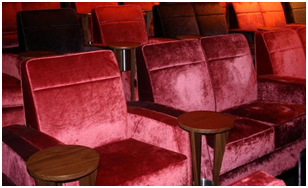
We went to see this on New Years Day at the recently revamped cinema in Walton. Gone were the traditional cinema seats, and the cramped feel that all cinemas seem to have. Instead we were treated to a 2 seater sofa,  masses of leg room and small tables on which to place your drinks. Very civilised.
masses of leg room and small tables on which to place your drinks. Very civilised.
We chose to see the 3D version of the film, which means that you have to wear some rather unflattering glasses (which do fit over your own spectacles). So armed with a cup of coffee and the 3d specs we settled down to see the film.
And the film. The 3D effects were great. Were they essential to the film? No, not really. Like any film, it is the story which is important.
The story covers the life of a boy called by Pi growing up in India. His parents ran a zoo
Martel asks important questions in this film. In the beginning, as Pi’s early life story is told, is the question of religion and the fragmentation of religion and religion’s relationship to the belief in God. At the end, another question is asked, which story do you prefer, the fantastic fable of a boy shipwrecked, in a lifeboat with only a tiger for companionship or a more realistic story of a boy alone in the lifeboat. As Pi points out, neither story answers the question “Why did the ship sink?”. So it is easy to miss the real questions that Martel is asking, questions to do with truth. How do we know what is true and what is not true. Sometimes we confuse the question of truth with what is real, or reality. However reality, when totally deconstructed is a bunch of sun atomic particles that sometime sexist and sometimes do not, sometimes they are here and sometimes somewhere else – with lots of space in between. Reality is not what I can see and feel and touch, for the particles that I can touch today may be somewhere else tomorrow and may even be part of the system that I call me. What is truth? Pi tells the Japanese investigators at the end of the book (and film) two stories. Can they both be true? The second story is unpalatable, for it deals with the rawness of survival and shatters the picture we have of Pi, a gentle and dreaming 17 year old boy, a boy who kills so that he will survive (and not be eaten). The stark facts of the second story do not necessarily contradict the first story. Are the two not different ways of telling the story of a boy who survives the destruction of his family and is cast adrift for 227 days alone in a small boat. And despite this, Pi survives, physically, psychologically and emotionally. And so it is with God. And a question of faith. Which story of creation do you prefer? The hard bald facts, or a creation story told by the world’s great religions. Are the great religions that Pi meets in India, Christianity, Islam and Hinduism not just different stories told about the same God?

 masses of leg room and small tables on which to place your drinks. Very civilised.
masses of leg room and small tables on which to place your drinks. Very civilised.